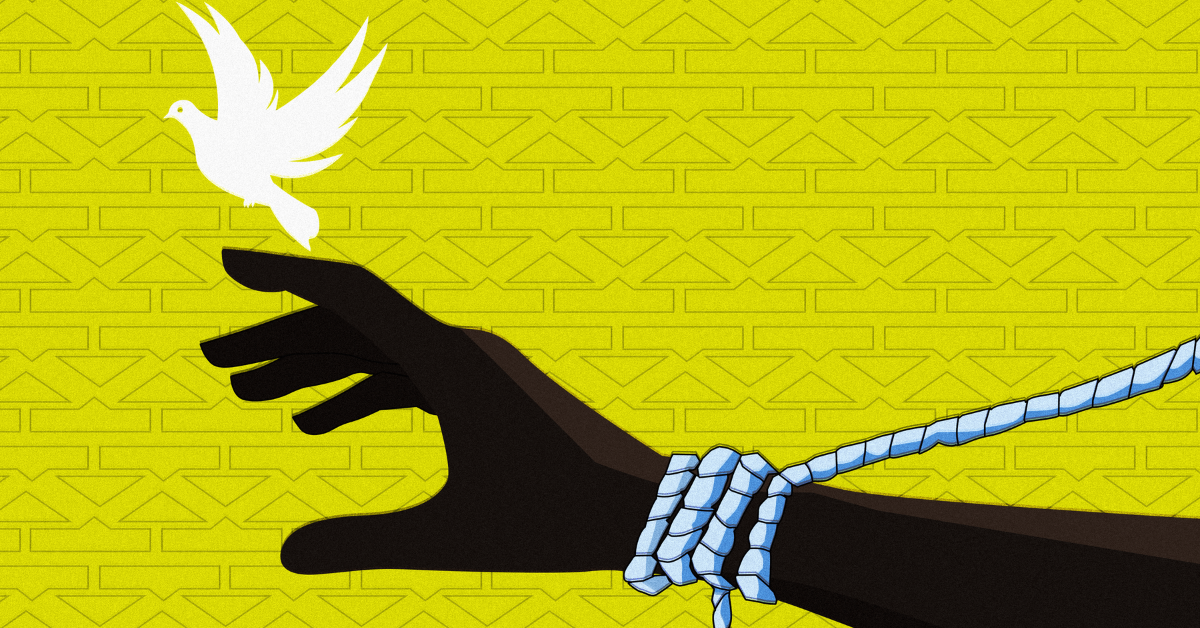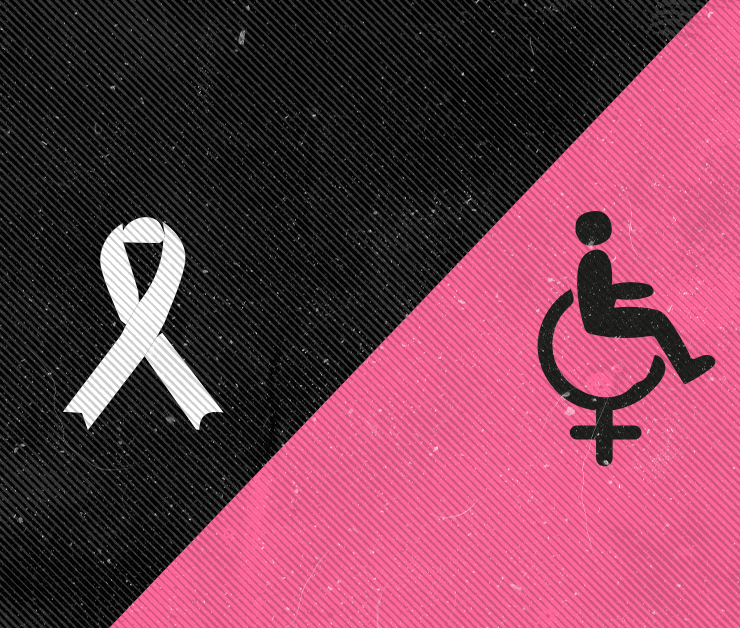“I have been treated unfairly”: The harmful traditional practice suppressing women in Nigeria
- Across the Idoma, Igala, and Ekureku people of Nigeria, certain traditions are keeping tabs on women’s fidelity, income, and their choice to bear children.

Image description: The image is an illustration featuring a silhouette of a woman’s hand reaching out for a dove against a bright yellow patterned background. Her hand is restrained by a tight blue rope bound to her wrists.
Benue, Nigeria (Minority Africa) — One Tuesday morning in April 2016, the Easter celebration was around the corner when, at about 3:34 AM, a thunderous knock startled 52-year-old Janet* and her six children. As she struggled with the door bolt, she whispered a prayer to herself, “Lord, not again.”
At the door was Oche*, her 77-year-old husband, who had come home drunk as usual in the company of a strange woman. As soon as he saw Janet, his jaw tightened and his hand curled into a fist. “I told you not to get a job but you are adamant!” he snapped.
Janet was only 17 when she was forced to marry Oche who was 42 in 1987. She had written her Senior Secondary School Certificate Examination (SSCE), the final lap in Nigeria’s basic education system, hoping to be a nurse.
Oche, a civil servant at the time, didn’t allow Janet to learn a skill or further her studies. “Anytime I tried to seek a job, he would threaten me with Aleku, the spirit of justice,” she says.
This prominent traditional practice is prevalent amongst the Idoma people of Benue State, Igala people of Kogi State, and Ekureku people of Cross River State in Nigeria.
The Idoma people believe in Aleku to maintain justice in the land. The Igala people believe in Ibegwu to uphold justice, while the Ekureku people believe in Edu-ekolo to protect the family.
The common feature in this tradition is that the spirit oversees women and keeps a tab on whether they are loyal to their husbands or not.
In 2016, when Janet got a ₦20,000 (around $48) job to cater for her children, Oche demanded she follow him to the village to swear an oath of purity in Aleku shrine. He must have sensed that she had summoned the courage to build herself.
“Since he married me I had not taken the oath,” she says. “[At the village] they will shave my hair and kill a fowl to prove my innocence.”
The patriarchal structure across Nigeria’s ethnic diversities contributes immensely toward perpetuating and promoting violence against women.
“In Owukpa community, where Oche and I come from, they say a wife does not have any right, whatever your husband does is the right thing,” Janet says.
A married woman in Idoma land is not expected to expend her legitimate income on projects such as building for her biological family or spend on other purposes, without the consent of her husband, to avoid the wrath of the gods, says Chief Ekere Oko, the Ochukore One of Ogbadigbo Local Government Area of Benue State.
Chief Oko says Aleku is a spirit of the ancestors of the Idoma people, and every woman that marries an Idoma man automatically binds herself to the tradition through the rituals usually performed as part of traditional marriage rites.
“If a man should cover his wife’s act of infidelity, he will die in her place. A woman is not expected to make any decision or buy anything for herself without the consent of her husband, else she will die,” he explains.
Janet refused to swear the oath and instead sought help from the National Human Rights Commission (NHRC), a body established to deal with all matters relating to the promotion and protection of human rights, and the investigation of alleged human rights violations.
“I have seen how women start shrinking to death the moment they swear the oath,” she says. “Even if the woman is guilty or not, she will die. So when the Human Rights Commission referred me to FIDA, I took [Oche] to court. I told him that I [would] rather get a divorce than have anything to do with his Aleku.”
The International Federation of Women Lawyers (FIDA), a non-governmental organization involved in the promotion, protection and preservation of the rights of women and children, provided pro bono legal service for Janet and the court dissolved her union with Oche in 2017.
Mary Abah Izam, the sole judge of the Plateau State Judiciary who ruled the case, says Aleku is inconsistent with the provisions of the grand norm in the 1999 constitution of Nigeria.
“Section 42 of the constitution outlined nondiscrimination, either by sex, culture and religion, but Aleku custom is discriminatory in nature and has been declared in one of my rulings [Janet’s case] as null and void to the extent of its inconsistency with the constitution,” Izam says.
The judge notes that what rendered Aleku discriminatory is the fact that the man is not expected to swear the same oath as the woman if he is found guilty of committing adultery.
“In [Janet’s case] both parties were alleging adultery against each other, yet the entire community were subjecting only the woman to take the oath to prove her innocence,” she adds.
Unlike Janet, many women have been suffering in silence. Fatima*, a 38-year-old indigene of Nasarawa State, was not able to escape the oath in the Ibegwu shrine.
In 2013, she married 46-year-old Idoko* who is from the Ogugu community in Olamaboro Local Government Area of Kogi State.
“I was forced to go for purification in Ibegwu shrine in 2020 because I took family planning. It was my mother-in-law that lured me to do it,” she reveals.
Fatima thought family planning was the best for the family since they were finding it difficult to provide for their five children.
Immediately after the oath, Fatima stopped taking the oral contraceptive. She was told that her husband would have died because she used his money to purchase it.
“My mother-in-law said I should have done it without involving my husband so as to prevent Ibegwu from striking him with a mysterious ailment. But she assured me that the rituals have cleansed the family,’’ Fatima recalls.
She however laments the division the oath has brought in her family.
“Even after taking the oath, I can not cook for my husband because he does not trust me. If I cook for him, he might fall ill and die,” Fatima says. “I have been treated unfairly.”
Chief Ogala Daniel of Ogugu in Olamaboro Local Government Area of Kogi State reveals that Ibegwu is a deity that forbids modern practices.
“Ibegwu will kill any man that gives his spouse money for abortion even if it’s because of a health condition,” he says.
In the same vein, Micheal Stephen, the Eval-egbonyi of Ekureku community in Abi Local Government Area of Cross River State, says that Edu-ekolo strikes a man who defends his wife’s infidelity.
Edu-ekolo does not strike men that commit adultery, except the woman he sleeps with is a married woman,” he says. “[Then] it will strike her and strike him too.”
Asked whether Aleku has eradicated adultery in Idoma land, Chief Oko says, “No, it has not stopped, but women know what Aleku can do.”
“The elders will prepare Idoko-Ejuja [a sacrifice of purification] to lift the curse on any woman that admits to adultery and other offenses,” he adds.
While advising women to renounce the custom, Izam emphasizes that harmful traditional practices have been condemned and are now liable to imprisonment or payment of an option of fine under the Violence Against Persons Prohibition Act (VPPA).
“So any man that tries to subject any woman to take such [an] oath, such a woman should sue the man. The VPPA will exonerate her from taking such [an] oath,” she adds.
It’s been five years since Janet took her husband to court. Although the court of law dissolved the union and protected her from taking the ‘Aleku’ oath, it couldn’t heal the traumatic experience of her abusive marriage.
“I have never enjoyed what they call marriage. It was a horrible experience,” she says.
Today, Janet runs her daycare and can provide for herself, her children and her extended family.
The scars on her body and the lines on her face appear to tell a deep story of a lifelong struggle but the light of relief that beams in her eyes now seems to tell the story of her strength.
“My daycare is my pet project and I believe it will grow in my hands,” she says.
Edited by PK Cross, Caleb Okereke, and Uzoma Ihejirika.
Nanji Nandang is a Nigerian journalist and radio broadcaster with over four years of experience in media broadcasting. She is the host of "Silent Voices," an educative radio show that amplifies the voices of women and girls. She is also an experienced fact-checker and pidgin news presenter.






